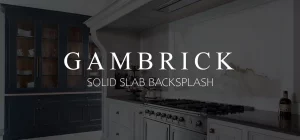
Can Concrete Countertops Handle Heat?
Concrete countertops are made from regular concrete like Quikrete, that’s poured into forms either at a factory or on site. Concrete is made by mixing cement, sand and stone with water. The ratio of each ingredient used in the mixture is called the concrete mix ratio. Special concrete countertop mixes are better for making countertops than a standard mix used for a patio or driveway. They typically have more cement, finer sand and smaller, more rounded stones. Many also include chemical hardeners and fibers which strength the countertops and make them harden faster and prevent cracks. But it’s still just concrete, which means your concrete countertops will be able to handle heat.
Concrete countertops are a masonry material, which means like all masonry, it can handle high amounts of heat without a problem. Concrete won’t break, melt or burn if you put a hot pan or pot on it. However, you have to be careful when the countertop is sealed.
Concrete is a porous material that needs to be sealed periodically. And sealants are effected by heat. If you place high heat on a sealed concrete countertop, you could damage the sealant. However you still won’t be damaging the concrete.
In this article, I’ll discuss different types of heat and how they affect your concrete countertops.

Can You Put Heat On Concrete Countertops?
Concrete countertops are heat resistant so it’s perfectly safe to place hot pots and pans on them. However, the concrete countertops must be reinforced properly and you have to be careful when using a sealant.
Concrete countertops are porous and need to be sealed to prevent stains. The sealer penetrates into the concrete’s pores which helps prevent water damage, stains and bacterial growth. But not all sealers are heat resistant. If you plan on placing hot items directly onto your concrete countertops, make sure you use a sealer that’s heat resistant. Otherwise you run the risk of damaging the sealant.
If you have concrete countertops and use a heat resistant sealer, you can place hot pots and pans directly on the counters. This is a big benefit when cooking because you don’t have to use cooking mats.
Concrete countertops can handle more than just direct heat. Even if boiling hot water spilled onto the concrete countertops, they won’t be damaged.

Direct Vs Indirect heat
There is a difference between direct and indirect heat.
Direct heat is heat that’s placed directly onto a surface. For example, placing hot pots and pans on your countertops is an example of direct heat. Pouring boiling water on a surface is another example. Concrete countertops are able to handle high levels of direct heat without being damaged.
Indirect heat is heat that doesn’t come in direct contact with the surface. Another way of saying indirect heat is ambient heat. An example of this would be a concrete countertop located by a fireplace. The heat coming off a raging fire is intense, but it doesn’t actually touch the concrete. Luckily concrete also has great indirect heat resistance. You can use cast concrete fireplace surrounds and countertops right up against a blazing fire without worrying about heat damage.
Internal heat is another type of heat. An example of this would be a heated concrete slab. Concrete is great at absorbing and transferring internal heat. For this reason it’s possible to heat concrete countertop slabs with either electric wiring or hot water. The internal heat won’t damage the counters in any way.

Are Polished Concrete Countertops Heat Resistant?
Polished concrete countertops are heat resistant. Polishing a concrete countertop surface doesn’t change it’s makeup or characteristics. It’s still a masonry countertops that’s made from sand, stone and cement. Concrete will always be naturally heat resistant. However, you still have to worry about other elements used on the countertops.
If you polish concrete countertops with a sealant or other type of polish, that material may not be heat resistant. It’s important to understand the difference between the concrete countertop and the products you use on them. Even though the concrete can handle high amounts of heat, that doesn’t mean the polish you use on them can.
Always make sure you use products, like polish or sealants, that are also heat resistant.

Not All Concrete Countertops Are Created Equal
Concrete is a man made product. It’s made by mixing sand, stone and cement with water. The ratio of each ingredient, including water, has to be just right in order to make strong concrete. The mix ratio I use is called 3.2.2. It’s made from 3 parts fine sand, 2 parts stone and 2 parts Portland cement.
To make things easier, I recommend buying a premixed countertop mix by Quikrete or another manufacturer. They’re mixed all the ingredients in the correct ratios for you which makes building concrete countertops much easier. However, you can mix you’re own concrete if you want to save money or need a custom mix.
The ingredients you use to make countertop concrete matters a lot. The stones should be rounded and relatively small. I use stones around 1/2 inch. Since most concrete countertops are only 1 1/4 – 1 1/2 inches thick, there’s not much space for large stones. And I like to use wire mesh inside my countertop slabs which also takes up some space.
I use fine sand because it creates a smoother surface. Coarse masons sand creates a grittier countertop.
I recommend using Portland brand cement. It’s a great product and very consistent with a good color.
If you’re mixing your own countertop concrete, I’d use some strengthening additives like fiber and a chemical hardener. They strengthen the countertops and make the concrete set up faster so you can finish in a day.
As long a you make the concrete correctly and don’t use too much water, your concrete countertops should be crack and heat resistant.

Concrete Countertop Characteristics
Here is a list of characteristics you can expect from concrete countertops that are built properly with the right concrete mix:
- Heat Resistance: Concrete is naturally heat resistant because it’s a masonry product. However, be careful about the sealer and polishes you use on it. Make sure to only use heat resistant products.
- Cost: Concrete countertops can be made DIY, but the cost is comparable to marble or quartz if you buy them from a professional.
- Sealing: Concrete is very porous and needs a sealant to make them water, germ and stain resistant.
- Stain Resistant: Concrete is porous and stains easily. In order to make it stain resistant you have to use a good quality sealer.
- Color: Concrete countertops are the natural gray color of concrete unless you add a color to the mix. In this case, you can make them just about any color you want.
- Versatility: Concrete countertops can be cast on site into any shape or size.
- Seams: If you cast concrete countertops on site, they can usually be built without any seams.
- Appearance Over Time: The appearance of concrete countertops can change over time which can be a benefit or a disadvantage. Keep them clean and care for them properly and they’ll look beautiful for decades. However, if you don’t, they’ll develop stains.

Summary: Can Concrete Countertops Handle Heat?
Concrete countertops are made from regular concrete like Quikrete, that’s poured into forms either at a factory or on site. Concrete is made by mixing cement, sand and stone with water. The ratio of each ingredient used in the mixture is called the concrete mix ratio. Special concrete countertop mixes are better for making countertops than a standard mix used for a patio or driveway. They typically have more cement, finer sand and smaller, more rounded stones. Many also include chemical hardeners and fibers which strength the countertops and make them harden faster. But it’s still just concrete, which means your concrete countertops will be able to handle heat.
Concrete countertops are a masonry material, which means like all masonry, it can handle high amounts of heat without a problem. Concrete won’t break, melt or burn if you put a hot pan or pot on it. However, you have to be careful when the countertop is sealed.
Concrete is a porous material that needs to be sealed periodically. And sealants are effected by heat. If you place high heat on a sealed concrete countertop, you could damage the sealant. However you still won’t be damaging the concrete.
If you have any questions about concrete countertops, email any time.

John Mazzuca | About | More Posts |
Custom Home Builder
John Mazzuca is a custom home designer and builder at Gambrick with over 25 years experience in the construction industry. John has designed, built and/or remodeled hundreds of homes, small buildings, and commercial projects. He writes about business, real estate, home building, and household electronics. His work has been featured in Fox Business, Better Homes & Garden, House Beautiful, and more.




















